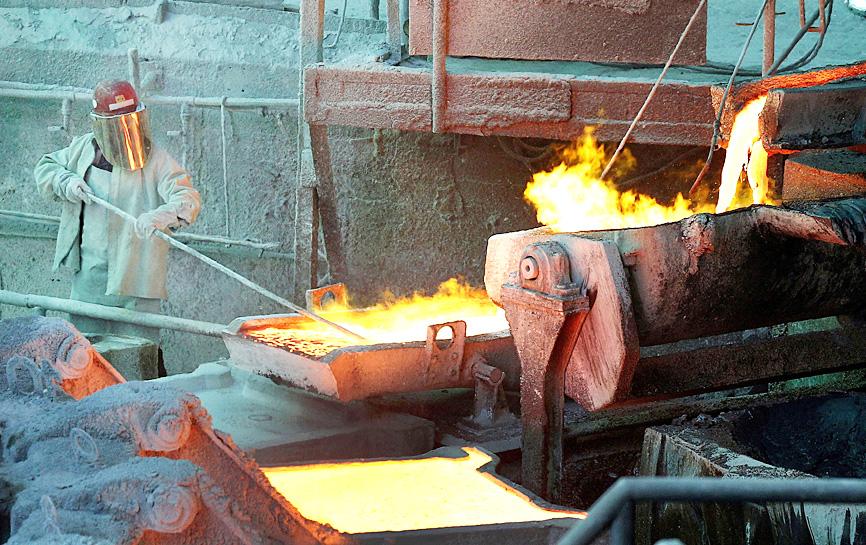Three unions from state mining enterprise CODELCO, the largest producer of copper in the world, are on strike after rejecting a new labor agreement, a union leader said on Tuesday.
The Suplant union began a strike on Tuesday at the Andina mining division to join two other unions that started industrial action last week. It comes just days after Anglo-Australian mining giant BHP reached a deal with workers at the world’s biggest copper mine, Escondida, also in Chile, to avoid strike action there.
The Andina unions have rejected a new labor agreement that would remove health benefits for new employees, as well as compensation related to years of service.

Photo: Reuters
“Suplant is declaring a strike because CODELCO’s executives want to reduce labor costs by removing health and taking away the rights to compensation for years of service, and we won’t allow it,” Suplant president Clodomiro Vasquez said.
The Andina division comprises the underground Rio Blanco mine and the open air Sur Sur mine, which together produced more than 184,000 tonnes of copper last year.
The three striking unions represent 1,300 of the 1,437 Andina workers.
The other two unions — the Industrial Union of Labor Integration and the Unified Union of Workers — released a statement saying “there has been a tremendous effort during the pandemic” and that they worked “under extreme cold and heat, exposed to physical and chemical risks ... mental burden and overwork.”
CODELCO, which produces 8 percent of the world’s copper, said the offer “represents the company’s maximum effort.”
While much of Chile was put under lockdown at times during the COVID-19 pandemic, the vital mining industry was always kept operational.
Chile is the world’s largest copper producer with 5.6 million tonnes a year, which makes up 28 percent of global output, much of which is sold to China, the world’s biggest consumer. Mining makes up 10 to 15 percent of its GDP and half of its exports.

TECH BOOST: New TSMC wafer fabs in Arizona are to dramatically improve US advanced chip production, a report by market research firm TrendForce said With Taiwan Semiconductor Manufacturing Co (TSMC, 台積電) pouring large funds into Arizona, the US is expected to see an improvement in its status to become the second-largest maker of advanced semiconductors in 2027, Taipei-based market researcher TrendForce Corp (集邦科技) said in a report last week. TrendForce estimates the US would account for a 21 percent share in the global advanced integrated circuit (IC) production market by 2027, sharply up from the current 9 percent, as TSMC is investing US$65 billion to build three wafer fabs in Arizona, the report said. TrendForce defined the advanced chipmaking processes as the 7-nanometer process or more

China’s Huawei Technologies Co (華為) plans to start mass-producing its most advanced artificial intelligence (AI) chip in the first quarter of next year, even as it struggles to make enough chips due to US restrictions, two people familiar with the matter said. The telecoms conglomerate has sent samples of the Ascend 910C — its newest chip, meant to rival those made by US chipmaker Nvidia Corp — to some technology firms and started taking orders, the sources told Reuters. The 910C is being made by top Chinese contract chipmaker Semiconductor Manufacturing International Corp (SMIC, 中芯) on its N+2 process, but a lack

Who would not want a social media audience that grows without new content? During the three years she paused production of her short do-it-yourself (DIY) farmer’s lifestyle videos, Chinese vlogger Li Ziqi (李子柒), 34, has seen her YouTube subscribers increase to 20.2 million from about 14 million. While YouTube is banned in China, her fan base there — although not the size of YouTube’s MrBeast, who has 330 million subscribers — is close to 100 million across the country’s social media platforms Douyin (抖音), Sina Weibo (新浪微博) and Xiaohongshu (小紅書). When Li finally released new videos last week — ending what has

OPEN SCIENCE: International collaboration on math and science will persevere even if the incoming Trump administration imposes strict controls, Nvidia’s CEO said Nvidia Corp CEO Jensen Huang (黃仁勳) said on Saturday that global cooperation in technology would continue even if the incoming US administration imposes stricter export controls on advanced computing products. US president-elect Donald Trump, in his first term in office, imposed restrictions on the sale of US technology to China citing national security — a policy continued under US President Joe Biden. The curbs forced Nvidia, the world’s leading maker of chips used for artificial intelligence (AI) applications, to change its product lineup in China. The US chipmaking giant last week reported record-high quarterly revenue on the back of strong AI chip